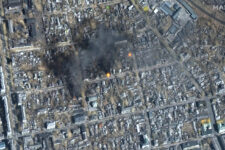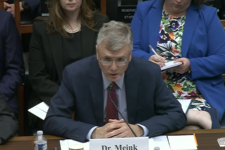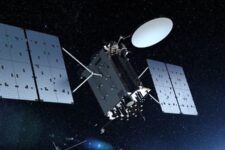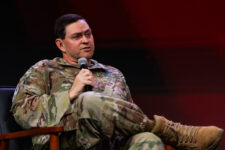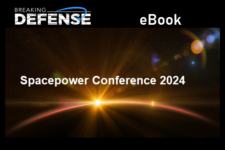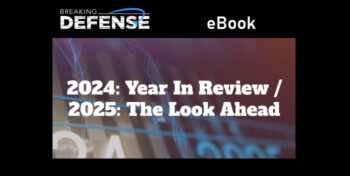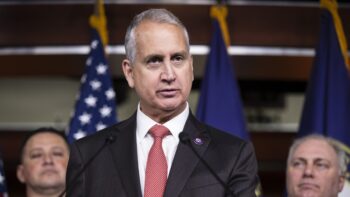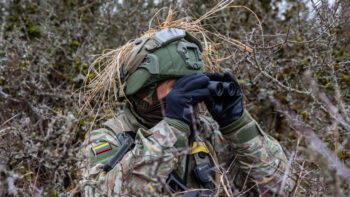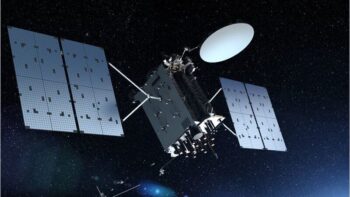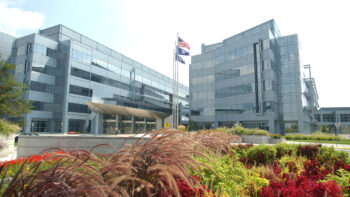
A circuit board overlays the Pentagon. (Graphic by Breaking Defense)
GEOINT 2022: Once the Pentagon’s top-priority program to speed the use of artificial intelligence across the military, Project Maven is now being transferred to the National Geospatial-Intelligence Agency, according to senior Intelligence Community officials.
“At the end of last month, the White House delivered President [Joe] Biden’s budget request to Congress for fiscal year 2023. In there, you may have noticed something interesting. In the budget, NGA gains operational control of Project Mavens’s GEOINT AI services and capabilities from the Office of Undersecretary of Defense for Intelligence and Security,” said Vice Adm. Robert Sharp, NGA’s outgoing director.
“That includes responsibility for labeled data, AI algorithms, test and evaluation capabilities, and the platform,” he told the USGIS GEOINT 2022 conference here in Denver on Monday.
Sharp explained that NGA already has an ongoing effort to leverage artificial intelligence (AI) and apply machine learning (ML) algorithms “to enable joint analysis at scale.” Further, he said, the agency has been cooperating with the Pentagon since Maven was stood up in 2017. Thus, the transfer of Project Maven will bring two major Defense Department AI/ML projects “together under one roof.”
RELATED: Pentagon’s big AI program, Maven, already hunts data in Middle East, Africa
Ronald Moultrie, DoD undersecretary for I&S, told the conference on Tuesday that the Pentagon and NGA currently are “setting the conditions” for that transfer. “We’re also working with Congress to make sure that they are satisfied and of course working throughout the department.”
He stressed that AI and Project Maven already have been “making a big difference” for the services and combatant commands.
“It’s delivering things that the warfighter is just astounded by and it’s really helping them to understand what’s in their space, not just in the Ukraine,” he said. “But we need to do more than Maven. We need to look at other capabilities that are out there.”
Both Moultrie and Sharp called on industry for assistance as the IC works to integrate and build up Maven’s past accomplishments.
“We take seriously this opportunity to provide strategic leadership and a corporate approach to GEOINT AI investments,” said Sharp. “In the months to come, we’ll be calling on industry as we progress with this great responsibility. We want to move forward together so we can deliver GEOINT at the pace that our warfighters and decision makers need. We have to be able to keep up with rapidly emerging digital trends. We have to be able to accelerate our ability to provide detections at the speed of mission to give our customers tactical, operational and strategic advantage.”
One key focus for NGA, he added, will be expanding Maven into the widespread use of “computer vision” — that is, using computer algorithms to rapidly sort through and integrate thousands of digital images to detect targets of interest and create a realistic operational picture in near-real time.
“Starting next fiscal year, will have complementary computer vision efforts that will deliver automated GEOINT detections to both intelligence analysts and warfighters,” Sharp explained. “In our key role as a Combat Support Agency, we’ll provide the subject matter experts — humans who can train the machine evaluate it and make sense of the output. We’ll bring together those disparate sometimes siloed communities of machine learning experts, data scientists, GIS experts and imagery analysts to improve AI model performance, develop standards and lead interoperability efforts for the GEOINT community.”
“These efforts will give us our millions of eyes to see the unseen,” Sharp said.
Mark Munsell, NGA’s chief technology officer, told reporters on Tuesday that a first step will be undertaking an assessment of Project Maven’s capabilities, looking at how to integrate those capabilities with those of NGA, and figuring out where future investment should be made to improve.
However, he said, there will not be any “pause” or gap in ensuring that warfighters are getting the tools they need. “I want to reassure everyone that we will not lose that focus.”
